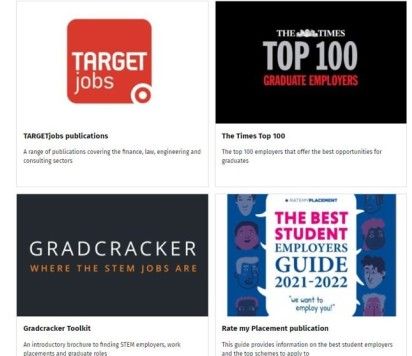 There are many different ways of finding internships and jobs.
There are many different ways of finding internships and jobs.
You can increase your chances of success by combining different methods and this page lists places to look for opportunities. You can also find information on finding part-time work on our dedicated page. For information on when to start searching see our page on application timelines.
JobsLive is Imperial's job board where you can find employers specifically targeting Imperial students and graduates. If you have previously studied at another university, you may still have access to their job board too.
Search for jobs
- JobsLive and GoinGlobal
- Student and graduate job boards
- Specialist job sites and professional bodies
- Catch-all job boards
- Recruitment agencies
- Hidden job market (unadvertised jobs)
- Social media and Generative AI
The Careers Service at Imperial offers two resources (JobsLive and GoinGlobal) to help you search for jobs in the UK and abroad. You can access these resources for up to three years after you graduate. Both contain jobs boards and are an easy way to start searching for opportunities.
JobsLive is a great place to start as all the opportunities will be suitable for STEM students/recent graduates, and you can filter them by industry sector, location, and job role. However, don’t limit your job search to this or any university jobs board as it won’t be a complete picture of all the opportunities out there.
GoinGlobal offers country specific career and employment resources including worldwide job openings and internship listings. You can access it via the Careers website for free. GoinGlobal also offers a specific internship search, which can be used for roles in the UK and abroad.
A streamlined way to search for internships and graduate/entry-level jobs is by using websites created for students and recent graduates. The advantage of these websites is that you do not need to filter out the opportunities only available to experienced professionals. There are some graduate focused job websites that are starting to use generative AI to match and link students to roles. Please do be aware that as with many uses for generative AI, there is little research to prove it works. However, these sorts of websites can be interesting to include in your broader job search when used with caution and common sense.
The best known graduate job boards are:
- Gradcracker – STEM focused
- TARGETjobs
- Prospects
- RateMyPlacement
- Milkround
- Bright Network
- Student Ladder
- Employment 4 students
- Graduatejobs.com
Try to check a variety of different sites and not rely on one website alone, as each job board will have different opportunities from different employers.
Many areas of the jobs market have their own website for job hunting related to that area. Examples of these include: jobs.ac.uk (jobs in universities), DataScientistJobs, OnlyDataJobs (data and analytics roles) PHARMAjobs, CharityJob, environment jobs, wellfound (jobs in start-ups) and AllAboutLaw.
Many occupations are represented by professional bodies, examples of these include the Royal Society of Chemistry, the Institute of Chartered Accountants of England and Wales (ICAEW) and the Chartered Institute of Patent Attorneys (CIPA). You can find more examples of these in the what can I do with my degree pages. Professional bodies often have advice for people considering careers in their areas and sometimes host useful jobs boards. They may also include membership directories that you could use to identify potential employers to make speculative applications.
You can search for both sector-specific jobs boards and professional bodies with the A-Z of Job Profiles on the Prospects website to find jobs relating to your interests. Each job profile lists relevant jobs boards and professional bodies towards the end.
The advantage of using specialist jobs boards and professional bodies is that you can find jobs directly linked to your interests. They also include jobs for more experienced professionals which could be interesting for you to read about as they can help you see the directions your career could develop in the future.
There are some well-known places on the internet to look for advertised jobs that have hundreds of thousands of opportunities listed. Examples of these include indeed.com and LinkedIn. These can be overwhelming if you have never looked for a job before. However, once you have a clear idea of what you are looking for, they can be very useful in your job hunting.
Recruitment agencies act as an intermediary on behalf of employers to find suitable candidates to fill vacancies. Many specialise in a particular sector and have temp departments that applicants can sign up to, for casual or part-time work. You should always check that any recruitment agency is a member of the Recruitment and Employment Confederation (REC) before using them.
A recruitment agency should be used to supplement not replace your own job-hunting strategies. Bear in mind that they are operating on behalf of the employer rather than the candidate and their priority is to get the vacancy filled rather than find the ideal position for you.
Not all employers advertise all of their jobs. This is what is known as the hidden job market. Advertising a job is often expensive and if an employer gets lots of applications, it can take a long time for them to process all of these. Smaller companies don’t have the money or people to dedicate to this. To find these unadvertised jobs you will need to approach organisations speculatively. Our webpage on speculative applications can help you with ideas on how to do this.
Large numbers of recruiters now have Facebook, X and LinkedIn profiles to share information with students and proactively look for talent. Follow companies you are interested in as many internships and jobs are advertised via social media.
Generative AI can also help you to source job listings. As with anytime you use generative AI, do be sure to sense check the outputs. For more information on using gen AI in your career planning, visit the Generative AI page.
